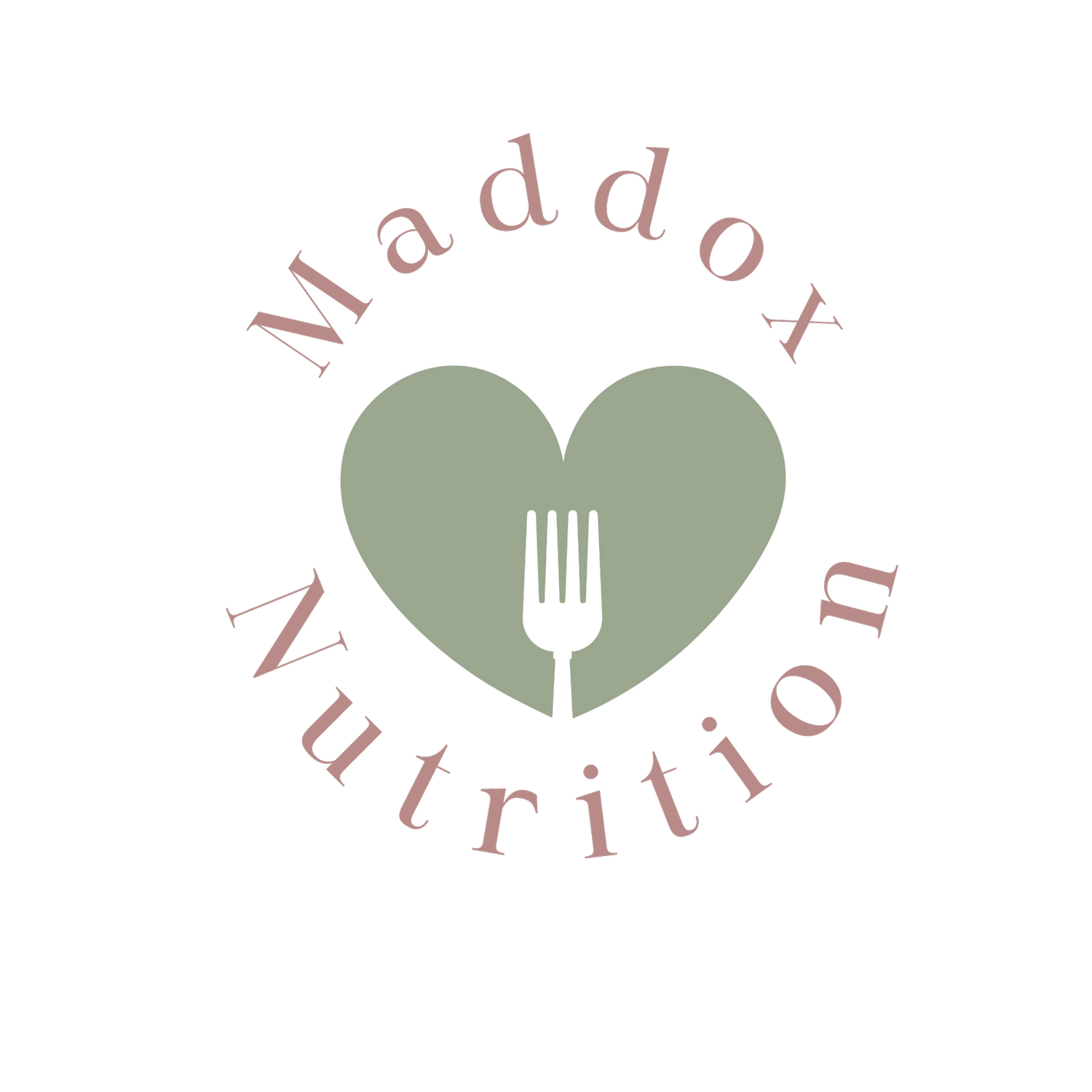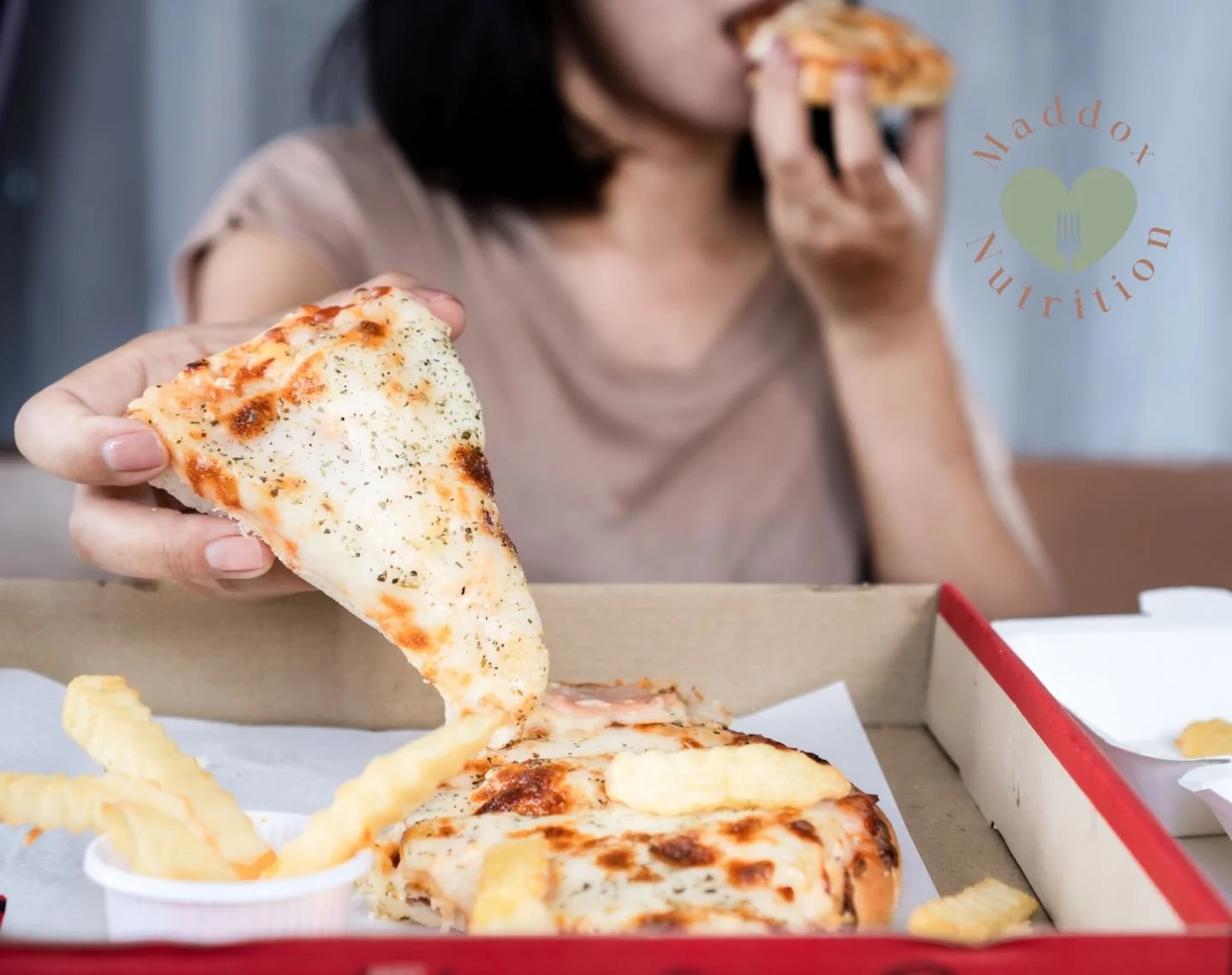How to Stop Obsessing Over Food
Food is meant to nourish, comfort, and connect us but for many people, it becomes a constant source of anxiety, guilt, or obsession. Clients often tell me they feel out of control around food, can’t stop thinking about food, and spiral into guilt after eating.
But food obsession isn’t a personal flaw or a lack of discipline. It stems from food restriction, food rules, and years of internalized diet culture.
Let’s unpack what food obsession really is, why it happens, and how to finally break the cycle that feels like it’s controlling your life.
Why do people obsess over food?
Food obsession goes far beyond simply "thinking about food a lot." It’s a persistent, overwhelming preoccupation with eating, food choices, and body-related behaviors that can interfere with daily life.
While it may appear as just a strong interest in nutrition or healthy eating on the surface, food obsession is often a symptom of something deeper such as chronic dieting, fear of weight gain, poor body image, or emotional distress.
In fact, research shows that restrictive dieting can trigger an increase in hunger hormones, intensifying your fixation on food. This biological response is your body’s way of signaling that it needs nourishment to survive and thrive, so what may feel like a lack of willpower is often a natural reaction to deprivation.
People experiencing food obsession might find themselves:
Constantly thinking about their next meal
Feeling out of control around specific foods
Replaying and analyzing everything they’ve eaten that day
At its core, food obsession is frequently driven by some form of restriction.
How restriction fuels food obsession
Even going on a “healthy” diet can create the perfect storm for food fixation.
When your body senses a lack of food, it kicks into survival mode. Whether you’re skipping meals or just telling yourself you “shouldn’t” eat carbs, your brain starts to fixate.
Mental restriction can be just as powerful. Telling yourself dessert is only allowed on weekends or that you need to “earn” meals through exercise creates a sense of scarcity. And scarcity leads to obsession.
How food obsession shows up in different eating disorders
Each disorder has its own patterns, but the obsession is real across the board.
Anorexia Nervosa: Despite severe restriction, food dominates thoughts. Behaviors might include meal planning, calorie tracking, and consuming food content online.
Bulimia Nervosa: Thoughts center around binge eating and purging, often paired with guilt and compulsive behaviors.
Binge Eating Disorder (BED): Involves intense cravings, secret eating, and a sense of loss of control.
OSFED & ARFID: People with Other Specified Feeding or Eating Disorders may also experience anxiety, avoidance, or hyperfocus on food—even if symptoms don’t match traditional criteria.
How different treatment approaches help reduce food obsession
Recovery from food obsession requires more than just “eating normally.” Healing involves restoring trust, reducing fear, addressing the root causes, and not just fixing the behavior.
Moreover, it involves a multifaceted treatment approach that supports both the physical and psychological aspects of recovery.
Nutritional rehabilitation
Many people dealing with food obsession are unknowingly under-eating, which keeps the brain in a state of perceived starvation.
This triggers survival-based thoughts about food, making it nearly impossible to stop thinking about eating.
Eating consistently and adequately throughout the day helps signal to the brain that food is no longer scarce, which gradually quiets the alarm bells and reduces mental preoccupation with food.
Challenging food rules
People struggling with food obsession often hold onto strict beliefs about what they “should” or “shouldn’t” eat. These rules create anxiety and can lead to intense food guilt or binge eating when they’re broken.
Learning to reintroduce previously feared or forbidden foods and proving to yourself that nothing terrible happens when you eat them can be a powerful step toward reclaiming food freedom.
Therapeutic support
Evidence-based approaches such as Cognitive Behavioral Therapy for Eating Disorders (CBT-E) or Dialectical Behavior Therapy (DBT) help individuals explore and reframe the thoughts that fuel food obsession. These therapies teach skills for emotional regulation, managing distress.
These therapies also shift unhelpful thinking patterns that may be linked to perfectionism, low self-esteem, or fear of weight gain.
Body image work
For many people, food obsession is closely tied to dissatisfaction with their body. The more shame or discomfort someone feels about their appearance, the more likely they are to fixate on controlling food as a coping mechanism.
Developing a more compassionate and accepting relationship with your body can help reduce the emotional intensity around food.
This opens the door to a more balanced, peaceful way of eating.
Overall, healing from food obsession is about understanding why food holds so much power in the first place, and then taking practical, compassionate steps to shift that dynamic.
How intuitive eating can help with food obsession
This non-diet approach promotes peace, not control.
Intuitive eating is about reconnecting with your body and breaking free from diets and the restrict-binge cycle. It encourages:
Unconditional permission to eat
Listening to hunger and fullness
Body respect, no matter your size
Letting go of guilt
Viewing nutrition and movement through a compassionate lens
At first, this approach can feel scary, like giving up control. But once you stop fighting your body, the anxiety fades, and food stops being the enemy.
If food takes up more mental space than you’d like, or if it feels stressful, guilt-ridden, or confusing, you are not alone. The good news is that recovery is possible, and you do not have to navigate it alone.
At Maddox Nutrition, we offer compassionate, evidence-based nutrition counseling for individuals struggling with eating disorders, disordered eating, and body image stress.
We also offer the option to incorporate a Christ-centered perspective into your care for clients who wish to integrate their faith into recovery.
Whether you're just beginning your recovery journey or looking to deepen your work around food and body image, Maddox Nutrition can be a meaningful part of your healing process.
Reach out today to learn how we can support you on the path to freedom from food obsession.
—
What you need to know
The difference between a Dietitian and Nutritionist
A dietitian is a regulated healthcare professional who has completed formal education in nutrition and dietetics, undergone supervised training, and is licensed to provide medical nutrition therapy for conditions such as diabetes, eating disorders, or gastrointestinal issues.
The title “dietitian” is legally protected in many countries, ensuring that only those who meet strict professional standards can use it.
In contrast, the title “nutritionist” is not always regulated, meaning anyone can call themselves a nutritionist regardless of training, though some may hold advanced degrees or certifications. Generally, dietitians are qualified to offer clinical nutrition care, while nutritionists often focus on general wellness and healthy lifestyle guidance.

